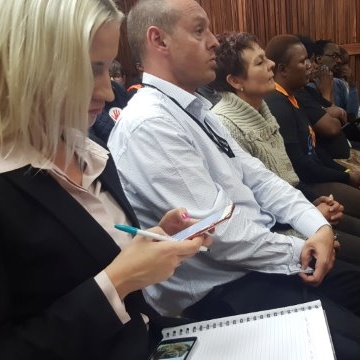
News

‘Frankel Eight’ fighting for other child victims
ANT KATZ
They were unable to prosecute Frankel – who died last month – because they legally only had 20 years to do so, before prescription. They are fighting to change this, as well as to enable all child victims of any sexual abuse, to be able to seek justice at any time.
This legal battle was played out in the Johannesburg High Court this week as lawyers for the so-called “Frankel Eight” argued to change the law that they believe unfairly denies them the opportunity to gain legal relief.
The “Frankel Eight” – Nicole Levenstein, Paul Diamond, George Rosenberg, Kathrine Rosenberg, Daniela McNally, Lisa Wegner, Shane Rothquel and Marinda Smith – are believed to be just a few of Frankel’s victims.
They say that the Minister of Justice – who promulgated the Sexual Offence Act in 2007 – erred in not having the law cover all child sexual assault. This denied his clients and thousands of others a right to legal relief, their advocate, Anton Katz SC, instructed by attorney Ian Levitt, told Acting Judge Claire Hartford.
“How do we tell a child who was abused 20 years ago that she can’t seek legal relief?” he asked the judge.
This week’s hearing tunnelled down far deeper into the dark side of Johannesburg billionaire, stockbroker and philanthropist, Sidney Frankel – which first emerged publicly in 2013 when grim details of allegations of repeated sexual violation of young children between the 1970s and 1990s emerged.
Frankel, 68, died on April 13 this year of cancer at his Abbotsford home. He had at one stage been patron of the Arcadia Jewish Orphanage and would take children out with him most weekends. They would either go to one of his homes or his game farm.
Katz told the court it was “absurd and irrational to exclude indecent assault” in the law and, referring to applicant Marinda Smith, “had it been rape we would not be here. But, because he [Frankel] used his finger and not his penis, we are!” And, added Katz: “To [make it worse] Frankel told her to be quiet about it.”
Smith could not recall how many times she had been abused between the ages of six and 12. Her mother, now in her seventies, “still has trauma from not having adequately protected her child”, he said. Her mother had worked for Frankel for 30 years.
Katz is only asking for relief in terms of children: “survivors, victims, applicants – whatever the correct term may be”.
However, three NGOs – Lawyers for Human Rights, Wits Centre for Applied Legal Studies and the Women’s Legal Centre – joined the case in order to seek to include adults in this change of law.
Having read some of the testimony of the applicants, Hartford asked: “Am I empowered to expand to adults?” The response from Katz was: “M’Lady, the Constitution differentiates between what the Court CAN do; and what the Court MUST do.” Katz added: “Your Ladyship is expected to make a decision as if she was the Concourt.”
Katz suggested to the Judge that she should at least rule on the application before her. He agreed that it made sense to cover all people, but his brief covered children only.
Billy Gundelfinger, for Frankel; and the State Attorney for the other two respondents – did not pose any objections.
The NGO Women and Men Against Child Abuse (WMACA) were present in the Court in numbers. Their director, Miranda Friedmann, vowed that the NGO would “continue our support for the applicants who really exposed themselves and what happened to them so courageously”.
Frankel was facing at least eight charges of child molestation and sexual abuse in what WMACA called “the worst-kept secret in Johannesburg’s business, Jewish and socialite communities”.
Judgment has been reserved.




